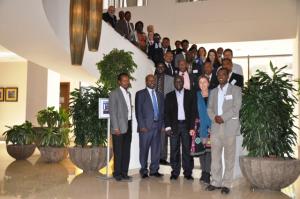Renewed Efforts for Disease Surveillance, Diagnostics, Drugs and Vector Control Imperative to Control Visceral Leishmaniasis
The World Health Organization’s Ethiopia Country Office hosted the WHO Consultative Bi-Regional Meeting on the Status of The Implementation of Visceral Leishmaniasis Control Strategies and Epidemiological Situations in Eastern Africa that was organized and facilitated by WHO Headquarters.
Leishmaniasis is caused by parasitic protozoa of the genus Leishmania. Humans are infected through the bite of phlebotomine sandflies, which breed in forest areas, caves, or the burrows of small rodents. Visceral leishmaniasis, also known as kala azar is one of the four main types of the disease, and is characterized by high fever, substantial weight loss, swelling of the spleen and liver, and anaemia. If left untreated, the disease can kill all of the infected persons within two years.
The East African sub-region bears the highest burden of visceral leishmaniasis next to the Indian subcontinent. The situation is made worse by the poor infrastructure, shortage of diagnostics, drugs and trained manpower and weak disease surveillance in the affected countries.
The consultative meeting aimed, among others, to discuss the progress and challenges regarding the implementation of visceral leishmaniasis (VL) control strategies in East Africa in the context of the WHO NTD roadmap, and to update on the epidemiological situation of VL and its prevention and control strategies in the endemic countries in East Africa, including coordination for the procurement of drugs and diagnostics and deliberate on the status of the WHO AmBisome donation programme implementation and assess the needs for the coming years . It brought together representatives from endemic East African countries (Ethiopia, Sudan, S. Sudan, Kenya, Uganda and Somalia), partner organizations (WHO, KalaCORE consortium, MSF, DNDi, IMA World Health, SOS Children’s villages-Somalia) to consult and discuss on the way forward for effective interventions.
For more information please contact
Dr. Abate Mulugeta
Neglected Tropical Diseases
WHO Ethiopia
Email: abatem [at] who.int
Loza Mesfin Tesfaye
Communication Officer
WHO Ethiopia
Email: tesfayel [at] who.int
Tel: +251 911 144 194




